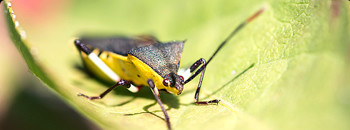Written by: Robin L. Tabuchi, Research Entomologist, University of California, Berkeley.
I have always been curious about insects. When I was little, I loved catching them and observing their behavior. Now that I have my own child, I love seeing the fascination in his eyes every time he spots an insect. No matter what he finds, he always wants me to pick it up and let it crawl on him. The tricky part is, not all insects can be “picked up.” Many bite or sting as a defense mechanism. These insects aren’t mean or bad, they’re just trying to protect themselves and their nests.
Insects that sting are all in the order Hymenoptera (bees, wasps and ants). The stinger is a modified egg-laying device, so only the female will sting. A very small percentage of people are severely allergic to bee and wasp stings. Even if you aren’t allergic, a sting from a bee or wasp can still cause pain and swelling.
There are two types of stinging insects: solitary (carpenter bees, mud daubers, and cicada killers) and social (honey bees, yellow jackets, paper wasps and hornets). Solitary bees and wasps rarely sting people. Their stinger is mainly used to subdue prey. They will sting people if they are trapped or taunted. Social stingers, however, primarily sting to defend their nests. People usually have the strongest reaction to social stingers because the venom is meant to keep us away from their nest.
What can you do to avoid getting stung? Stay away from known nests and do not try to knock them down. If a nest needs to be removed, contact a professional. If you are attacked, cover your head and go inside a structure or vehicle. If you stay put you will likely get many more stings. Social wasps will release a marking scent when they sting that attracts other members of their colony to attack.
Minimize the use of perfumes and try not to wear bright colors when enjoying your picnic or pool party. These can attract stinging insects. If one happens to land on you, wait for it to leave or gently brush it away. Swatting at a stinging insect will only increase your chance of getting stung.
How can you keep stinging insects from building nests in your yard? Check the eaves of your house for gaps and cracks. These are ideal places for stinging insects to nest. Also, keep pet food and trash cans covered so they don’t attract foraging bees and wasps.

